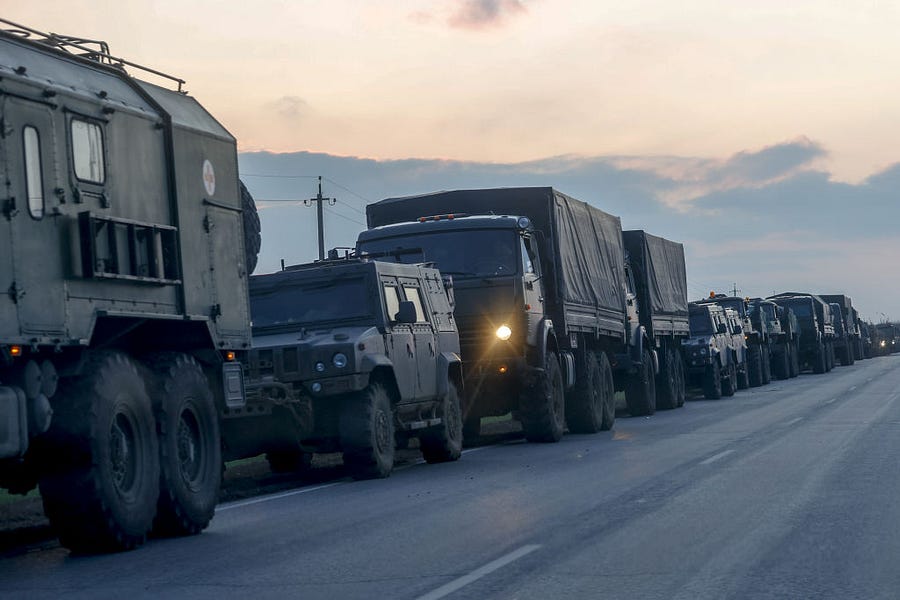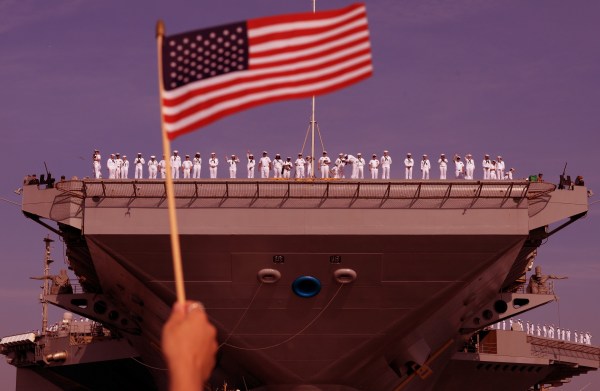Putin’s war in Ukraine has entered its Grozny Phase, where the village is destroyed in order to save it. We now see the Russians escalating use of large-scale and indiscriminate artillery barrages against civilian targets—and there should be no doubt that this is intentional, not accidental—and “thermobaric,” “vacuum,” or fuel-air explosives. If the charge about the employment of thermobaric weapons is true, it “would potentially be a war crime,” as White House press secretary Jen Psaki acknowledged.
There are situations where the use of such weapons has a legitimate military purpose. They can be highly effective against deeply entrenched fortifications such as underground command posts or cave complexes, or against large armored formations in the open. They work by first dispensing a cloud of aerosol gas or tiny metallic fragments, then setting them alight with a second explosion. This produces tremendous overpressures and sucks the oxygen out of a large area, in effect vaporizing the area. Used against apartment blocks, it both vaporizes and terrorizes. The Russian military has been the most profligate in using both artillery- and aircraft-delivered fuel-air explosives, notably in Chechnya and Syria, where it faced resilient insurgencies. In both cases, it snatched a brutal victory from the jaws of defeat, not only rescuing the Assad regime but catapulting Vladimir Putin to the throne in Moscow in 2000.
At the moment, there is very little the Ukrainians can do to prevent or respond to this onslaught. The immediate task for Russian ground forces is simply to protect their artillery parks outside Kyiv, Kharkiv and other cities. As the weight of the Russian air force becomes felt—these need not be precision-guided weapons—not even the dogfighting “Ghost of Kyiv” can rescue the situation.
Nor are even the most aggressive economic sanctions really responsive to this immediate moment. Nor are short-range air-defense weapons such as the Stinger or anti-armor missiles like the Javelin nor the provision of excess Sukhoi fighters from neighboring ex-Warsaw Pact militaries. Both sanctions and defensive weaponry are necessary and welcome but not sufficient.
In sum, we are at a decisive moment of the war, for American security interests in Europe and for the political principles of the liberal West. It is not melodramatic to say that if the free Ukrainian government is to survive, even in a rump state where the Donbas has been lost, active intervention is required. To will the end is to will the means.
Just as this moment asked Volodymyr Zelenskyy to transform himself from a comedian who played a president on television into a war president, it asks similarly searching questions of Olaf Scholz, Boris Johnson, Emmanuel Macron, the leaders of Eastern Europe and above all, Joe Biden; if America does not lead, no one else can. Until now, the president has seemed a small and continually shrinking man, continuing the come-home-America trends that began with Barack Obama, surged through the Trump years and have marked the first Biden year, Afghanistan being the uber-example. Biden was not interested in war, but war was interested in him.
Alas, the president did not realize the opportunity of the State of the Union speech to seize the moment. With the Ukrainian ambassador looking on, with blue and yellow flags waving across the well of the House of Representatives, all that the government of the United States could muster was a heartfelt hug from Jill Biden. The president boasted about sanctions. These will no doubt constrict the Russian economy and, eventually, the Russian war machine. But seizing yachts is hardly a proportionate response to brutal bombing. Biden announced the closing of American airspace to Russian aircraft—as though that was the airspace that mattered. Not even the pledge to defend “every inch” of NATO soil was matched by a promise to increase U.S. defense spending, as even the Germans will do.
Throughout his career, Biden has been a trimmer. And the temptations to hedge, whether it be toward his progressive eft flank or to the China-first lobby to his right, remain powerful. But the space for maneuver is narrowing. Beyond the inevitable and immediate risks of war, now further charged by Putin’s nuclear “alert,” will come the need to commit to a rapid—and thus inefficient and costly—and extended reinvestment in military power. To put a finger in the European dike will spring leaks across the Pacific. For some time, and in both theaters, America and its allies will be vulnerable.
The risks of delay now begin to loom larger than the risks of action. The emerging Biden Doctrine has called for a global coalition of democracies. This is not mere idealism, but the only realistic way to unite a widely divergent herd of allied cats from Eastern Europe to East Asia, a coalition now dependent upon frontline states with the greatest incentives to cut deals with the tyrannies next door. If America and its allies sacrifice Ukraine, it cannot anticipate sacrifices from others.
This war reveals not just a world of great-power competitors but a world of great blocs. What Napoleon said of battalions—that “God always favored the big” ones—is likewise true of coalitions. Against our will and our fondest wishes, the enemy is closing. It is the time to fix and present bayonets.






Please note that we at The Dispatch hold ourselves, our work, and our commenters to a higher standard than other places on the internet. We welcome comments that foster genuine debate or discussion—including comments critical of us or our work—but responses that include ad hominem attacks on fellow Dispatch members or are intended to stoke fear and anger may be moderated.
With your membership, you only have the ability to comment on The Morning Dispatch articles. Consider upgrading to join the conversation everywhere.